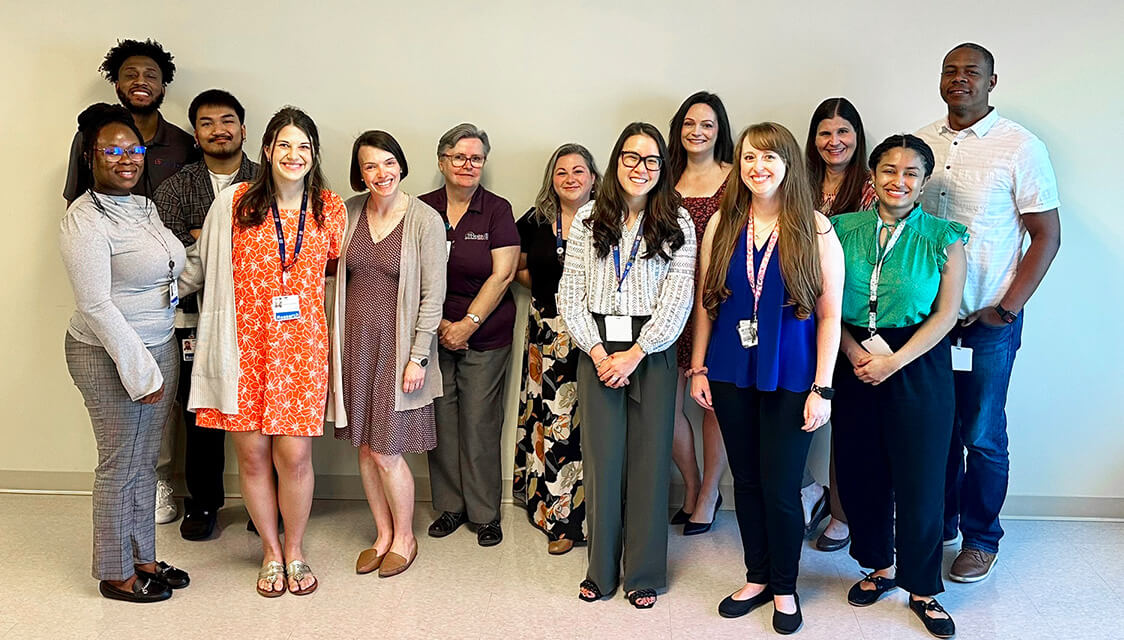The team behind the scenes of clinical research and trials
By Christina L. Mershell
Share:

Why Does Clinical Research Make a Difference?
The UF Health Proton Therapy Institute would not be here without decades of research on the role of proton therapy to treat cancer. And there is still more to learn.
Research is done through the development and execution of clinical trials. Each trial has the goal of answering a question as it relates to previous research. While some clinical trials are finding out if a new treatment can help people, other trials are helping improve the treatments that are already being used.
“Clinical research plays a crucial role in driving medical advancements, improving patient care and ultimately saving lives. It's an integral component of current healthcare that continually pushes the boundaries of what is possible in medicine and contributes to better health outcomes for patients and communities alike,” said Robin Cacchio, RN, CCRP, director of clinical research services.
What Is Important About the Research Done at the UF Health Proton Therapy Institute?
91% of almost 12,000 patients have agreed to be a part of our Clinical Outcomes Tracking Protocol. The purpose of this study is to collect information from patients regarding their diagnosis, their treatment and the side effects they experience from radiation to better understand treatment outcomes and make recommendations to improve patient quality of life.
In addition to the existing open clinical trials at the UF Health Proton Therapy Institute, our radiation oncologists collaborate with the radiation oncologists at UF Health in Gainesville, and other radiation oncologists around the country, (and the world) to offer clinical trial options to as many cancer patients as possible.
“It is important to the staff that the research conducted at the Institute contributes to improving the overall knowledge and understanding of cancer treatment,” says Jonathan Gaskins, BS, CCRP, clinical research coordinator.
Many of our studies begin as benchmark studies. We want to understand patient outcomes based on current treatment guidelines. Research end points often measure disease control, survival rates, rates of cancer recurrence and treatment side effects.
Our physicians and research team analyze the data from the benchmark trials to determine where they can make improvements. As a result of this analysis, a change in the number of treatments or the radiation dose may be recommended to lower cancer recurrence rates. This could also potentially reduce side effects for patients.
Researchers develop new clinical trials from these hypotheses. The goal is to use the study results to update treatment recommendations. This way, patient outcomes can keep improving.
“Clinical research makes a difference by looking into innovating healthcare to improve outcomes. With research, we have been able to be improve our efficiency in treatments of illnesses,” says Ed Michel, BHS, clinical research coordinator.
How Does Research Help Patients?
Researchers and doctors use data from clinical trials. This helps them understand how well cancer treatments work. It also shows which patients might benefit the most from a specific treatment.
Once researchers and doctors make these discoveries, they can share their data. This is especially true for those at the University of Florida. This allows other doctors and patients to use the information to improve cancer care. Read our blog about understanding a cancer research article.
A diagnosis of cancer can be overwhelming, as well as reviewing the many different treatment options available.
According to clinical research coordinator, Magory Dolcy, MPH, “Clinical research allows patients to have a fuller understanding of their choices of treatment and the potential long-term effects of those treatments. The research provided at the Institute allows there to be increased transparency between the treating site (the UF Health Proton Therapy Institute) and the patient, which ultimately helps patients to build trust (in their physicians and the care they are receiving).”
Research gives insurance companies data to help them with their coverage plans. Sharing this data with both these companies and the public is important.
Nancy Mendenhall, MD, is editor in chief of the International Journal of Particle Therapy. The editing board's goal for this research publication is to share data with everyone. This includes insurance companies. That is why they created this journal to be “open access.”
Many insurance companies motivate patients to participate in clinical trials.
“Some insurance companies will only pay for proton therapy if a patient is enrolled in a clinical trial,” says Valerie Fergusson, RN, CCRP, clinical research monitor.
Who is on a Clinical Research Team and What Do They Do?
The clinical research team at the UF Health Proton Therapy Institute is comprised of radiation oncologists (physicians), medical physicists and a team of over 14 research professionals. A Director of Research Services leads the team alongside a Director of Analytic Services, who is a biostatistician. The team also includes research coordinators, a data manager, a research monitor and research assistants.
For one of the largest current clinical trials comparing photon radiation vs proton therapy for prostate cancer, which is funded thanks to a grant from the Patient-Centered Outcomes Research Institute (PCORI), three additional research professionals are on-staff.
Our cancer care team may join the research process. This includes nurses, leadership administration, radiation therapists, intake and billing professionals. Their involvement depends on the type of study and the researchers analyzing the data.
When clinical trials are developed, the research team works with a physician or physicist to submit the proposed trial to the Institutional Review Board (IRB). The IRB ensures that any research involving human subjects, or their personal information, is done in a manner that is ethical, protects the rights of the patients involved in the research and keeps them safe. The IRB approves clinical trials before they can start working with patients and provides regular review of the processes involved in data collection and ensures that informed consent is provided to any person in a research study. The research coordinators manage every step of this process from the regulatory approvals to the submission of the final publication based on the research.
Research coordinator, Audrey Gardner, MPH, CPH, CCRP, explains: “Our work includes working with physicians and physicists to submit a study to the Institutional Review Board (IRB) for review and approval, training study staff on their roles and responsibilities in research studies, reporting data to study sponsors and submitting regulatory paperwork to the IRB throughout the course of the study.”
After a member of the clinical team has discussed a clinical trial with a patient and determined that the patient is potentially eligible for the study, one of the roles of the research and clinical team is to review the clinical trial consent form with the patient. This process allows the patient and their family the opportunity to ask questions and understand what is involved with the clinical trial. This is part of the process called informed consent.
Coordination of research studies involves continually monitoring the processes and steps taken to ensure accuracy of data and adherence to all regulatory compliance requirements. The research team works with patients, nurses, and other clinical members. They collect data and support everyone in the study team.
Research monitor Valerie shares, “I assist the research coordinators and the clinical team in making sure we are being compliant with the protocol, regulations and guidelines. I am the second set of eyes.” This is important to make sure the clinical trials result in quality data. It also helps protect the patients in the studies.
Ashley Williams, BA, CCRP, clinical research coordinator, shared, “At the UF Health Proton Therapy Institute, we’re also somewhat unique compared to a lot of other institutions in that our research coordinators are akin to project managers – we have a hand in almost every aspect of the research studies we manage.”
Improving on Past Clinical Studies
The large clinical study referenced above on prostate cancer is known as COMPPARE, “A Prospective COMparative Study of Outcomes with Proton and Photon RAdiation in PRostate CancEr” and evolved as a result of previous studies.
One of the study-funded research coordinators for COMPPARE, Brittany Kennedy, MHA, explains her role as, “A few of my duties include but are not limited to monitoring protocol adherence across multiple external sites while maintaining a cumulative log of all deviations for our study, monitoring external patient compliance, monitoring quality of life questionnaires for all internal patients, and assisting patients with any participant payment questions or issues.”
One of the limitations of many studies is not having enough participants to garner statistically significant results. To include more participants, the study collaborated with 51 radiation centers across the United States. This helped to better represent people from all over the country. Thanks to the work of all 51 centers, over 2,500 men joined the clinical trial.
The goals of this trial include comparing quality of life and side effects as reported by patients, cure rates and the effectiveness of a shorter course of therapy for patients treated with both proton and photon radiation.
According to the study overview, “This study will directly compare the potential benefits and harms of protons versus photons. It will emphasize patient-centered outcomes and will help future patients make informed treatment decisions. The results will also provide insurers with the data needed to make coverage and policy decisions around the use of proton therapy for prostate cancer.”
Another area of research that is growing quickly is the study of head and neck cancers, especially oropharyngeal cancer. Previous research shows that cancer patients with the Human Papillomavirus (HPV) respond better to radiation treatments. This means they may need less radiation to be cured.
Now, clinical trials are being used to determine which patients with HPV positive cancers of the head and neck can receive less radiation and still have treatment that is effective.
Roi Dagan, MD, MS, works at the UF Health Proton Therapy Institute. He is one of the lead researchers in a trial out of the University of Florida Health Cancer Center.
This trial looks at the levels of cell-free HPV DNA (cfHPV DNA) in a patient’s blood. It uses this information to see if fewer radiation treatments are effective. The results of this study may lower the number of treatments for head and neck patients. This could also reduce the side effects that many people face when treated for these cancers.
Experience, Expertise and Teamwork
The research team members at the UF Health Proton Therapy Institute have over 70 years of combined clinical research experience, spanning across various areas of medicine. This is what makes the UF Health Proton Therapy Institute research team so unique and qualified to maintain the highest standards of clinical research required by an NCI Designated Cancer Center. The combination of their diverse skill sets and experiences is a driving force behind the high caliber research that has come to be expected from the UF Health Proton Therapy Institute.
Many research staff members have improved their education by earning the Certified Clinical Research Professional (CCRP) certification from SOCRA.
In addition, the team supports each other through the complex processes and decision making involved in research studies. They take the time to get to know each other through informal team building activities, which makes them such a cohesive and supportive group.
“The camaraderie in our department is really special, and it’s one of the keys to our success and productivity,” said Ashley, clinical research coordinator.
Click here to read more about the team, how they support each other and why they do the work that they do.
The UF Health Proton Therapy Institute is always working to improve cancer treatment. Our research coordinator team helps with this effort. Every year in May, Clinical Trials Day is celebrated nationally. In May, and every day, we appreciate their dedication to our patients and research.



